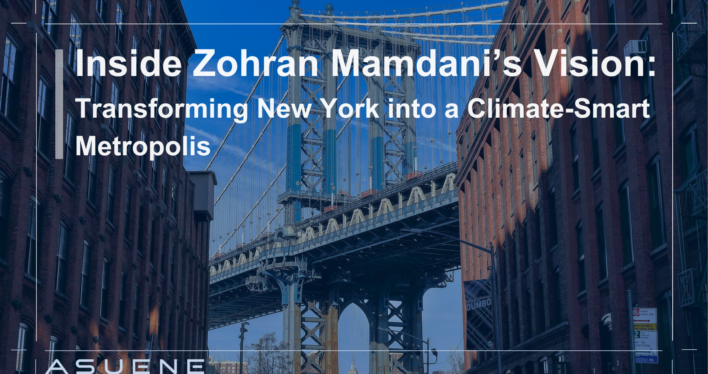- Article Summary
-
Overview: A New Climate Leadership Emerging in NYC
Zohran Mamdani, the winner of the Democratic primary for New York City Mayor held on June 28, has captured the attention of both American and international audiences with his innovative vision for New York City. Mamdani’s climate-smart initiatives propose transformative urban planning, energy reforms, and inclusive policies designed to transition New York into a global model for sustainability. This article explores the details of Mamdani’s ambitious vision, providing insights into his policy proposals, challenges, and potential impacts.
Climate-Smart Infrastructure and Equitable Sustainability: Reinventing Urban Mobility, Housing, and Climate Justice
Mamdani’s comprehensive climate-smart strategy emphasizes decarbonization of urban mobility and housing sectors while ensuring equitable outcomes for all New Yorkers. Key proposals include:
- Expand zero-emission public transit systems.
- Implement citywide electric vehicle charging networks.
- Retrofit existing buildings for maximum energy efficiency.
- Expand green spaces, particularly in underserved neighborhoods.
- Launch community-owned renewable energy projects.
- Promote equitable job creation in sustainability sectors.
Detailed examples and pilot projects illustrate how these interconnected initiatives could significantly reduce the city’s carbon footprint, enhance urban livability, and address historical environmental injustices faced by disadvantaged communities.

Navigating Regulatory Changes and US Standards Post-2025
Mamdani’s policies align closely with stringent international and U.S. federal standards emerging post-2025. These policies include:
- Zero-Emission Public Transit and Infrastructure: Expanding sustainable public transit and citywide electric vehicle charging infrastructure to directly support national carbon neutrality goals by 2050.
- Energy-Efficient Building Retrofits: Conducting extensive retrofitting of residential and commercial buildings to significantly reduce urban emissions, aligning with federal efficiency mandates.
- Renewable Energy Expansion: Promoting solar, wind, and community-owned renewable energy to meet federal renewable energy targets, reducing dependency on fossil fuels.
- Climate Risk Disclosure Requirements: Enforcing comprehensive climate risk disclosures in municipal projects, aligning with anticipated federal regulations on climate risk transparency.
- Circular Economy Initiatives: Encouraging sustainable consumption, waste reduction, and recycling practices, aligning with upcoming federal sustainability standards to drastically reduce landfill use.
| Policy Area | U.S. Federal Standards (Post-2025) | Mamdani’s NYC Initiatives |
|---|---|---|
| Zero-Emission Public Transit | Federal goal for carbon neutrality by 2050 | Expanded zero-emission public transit and EV infrastructure |
| Energy-Efficient Building Retrofits | National building efficiency and emissions reduction goals | Citywide retrofitting of residential and commercial buildings |
| Renewable Energy Expansion | Increased renewable energy targets | Community-owned renewable energy, solar, and wind projects |
| Climate Risk Disclosure | Mandated climate risk transparency for public projects | Comprehensive climate risk disclosures in municipal projects |
| Circular Economy Initiatives | Federal standards promoting recycling and reduced landfill use | Sustainable consumption, waste reduction, and recycling initiatives |
Challenges Ahead: Political, Economic, and Societal Barriers
Despite the visionary nature of Mamdani’s proposals, significant obstacles remain, including political opposition, funding constraints, and societal resistance. To effectively navigate these challenges, Mamdani proposes several strategic approaches.
Fostering Public-Private Partnerships: Establishing meaningful collaborations with businesses, investors, and private sector stakeholders to pool resources, leverage specialized expertise, and accelerate sustainable development projects.
Innovative Financing Mechanisms: Employing financial instruments such as green bonds, climate-focused investment funds, and targeted incentives designed to attract investment, enhance financial flexibility, and alleviate pressure on public budgets.
Extensive Community Engagement: Proactively engaging local communities through dialogues, public consultations, and participatory planning to build consensus, ensure transparency, and generate widespread public support for climate actions.
Conclusion: New York as a Global Benchmark for Climate Action
Zohran Mamdani’s climate-smart vision positions New York City not just as a national leader, but as an international benchmark for sustainable urban transformation. The successful realization of his ambitious plans could inspire global metropolitan cities, reinforcing the importance of proactive climate leadership in securing a sustainable future for urban populations worldwide.
Why Work with ASUENE Inc.?
Asuene is a key player in carbon accounting, offering a comprehensive platform that measures, reduces, and reports emissions, including Scope 1-3. Asuene serves over 10,000 clients worldwide, providing an all-in-one solution that integrates GHG accounting, ESG supply chain management, a Carbon Credit exchange platform, and third-party verification.
ASUENE supports companies in achieving net-zero goals through advanced technology, consulting services, and an extensive network.


